Posted on September 30, 2022
Culture Shocks
I think you can only really talk about a country if you’ve lived there for at least a year. That’s enough time to understand the culture and to reflect on the things you liked and the things you didn’t like. This is my Germany edition. For a glimpse into my year abroad, check out my post here.
Positive German Culture Shocks
Public Transportation Is Efficient and Accessible
You don’t need a car in most German urban cities. There are so many reliable modes of transportation ranging from trams (street trains), S-Bahns (a faster train that gets you to places in the city) U-Bahns (underground metro), busses, and for those days you just don’t feel like walking those shorter distances, there’s usually always a bike or scooter you can rent through an app to use around the city. It’s also all on the honor system which I thought really spoke to the uniqueness of German culture. In Germany, you do not scan a ticket to get onto the trains or the busses, there are only ticket checkers that come on irregularly. You could essentially ride for free as long as no is monitoring, but if they are, it’ll run you a €60 fine, so play it safe!
In the US, outside of major metropolitan cities, there is no public transportation that could get you around the city in a timely manner. Even if there is public transportation available, depending on your city, it’s considered unsafe particularly for women riding at night. Uber or phoning a friend, would be your only best option.
S-bahn station in Leipzig
Bike Friendly City
Bikes are one of the best ways to get around the city especially in the summer. In Germany, bikes share the sidewalk with pedestrians and are marked with a separate lane. This allows for a safer way to commute so bikes don’t interfere with cars or people walking.
In the US, it’s unusual for a city to even denote bike lanes, so you are forced to hug the edge of the road to stay out of the way of cars. Bikes are technically not allowed on sidewalks, but riding with cars can be so dangerous that’s it better to just try to safely ride with pedestrians walking than to risk getting hit.
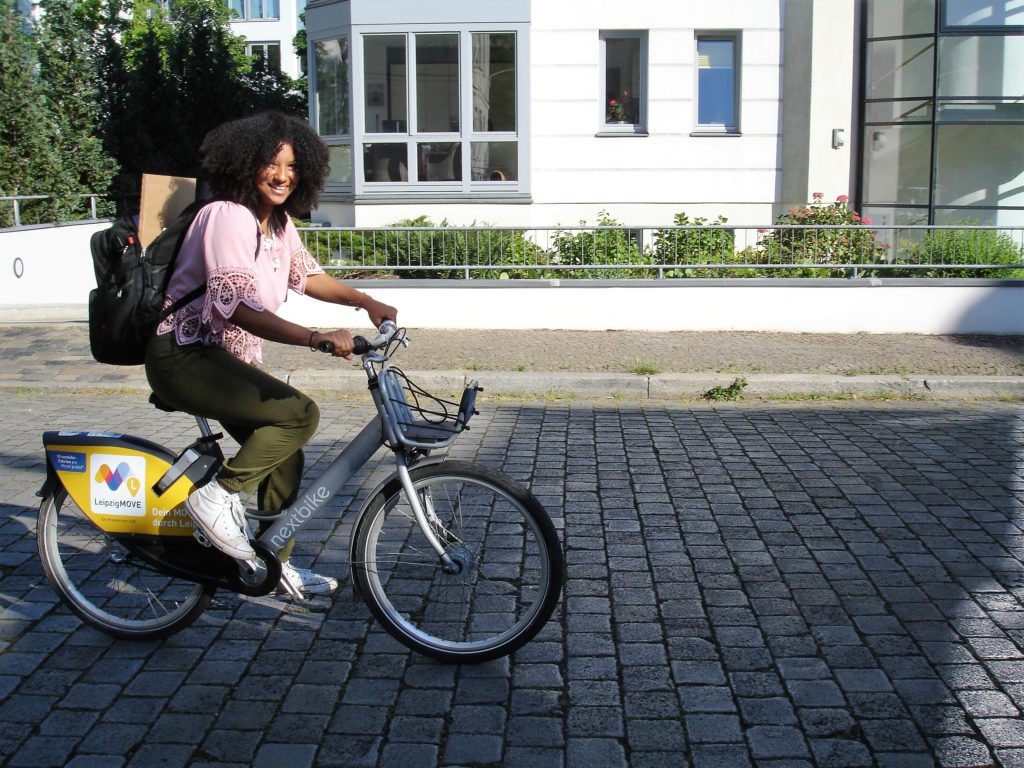
Biking around Leipzig
Walkable City
It wasn’t until I came back to the US where I am bound by force to use a car, did I realize how much those little breaks in my day just to walk, impacted my mental health so positively.
Glass recycling by color in Germany
German pfand system! Recycling your bottles in exchange for money
Health Care
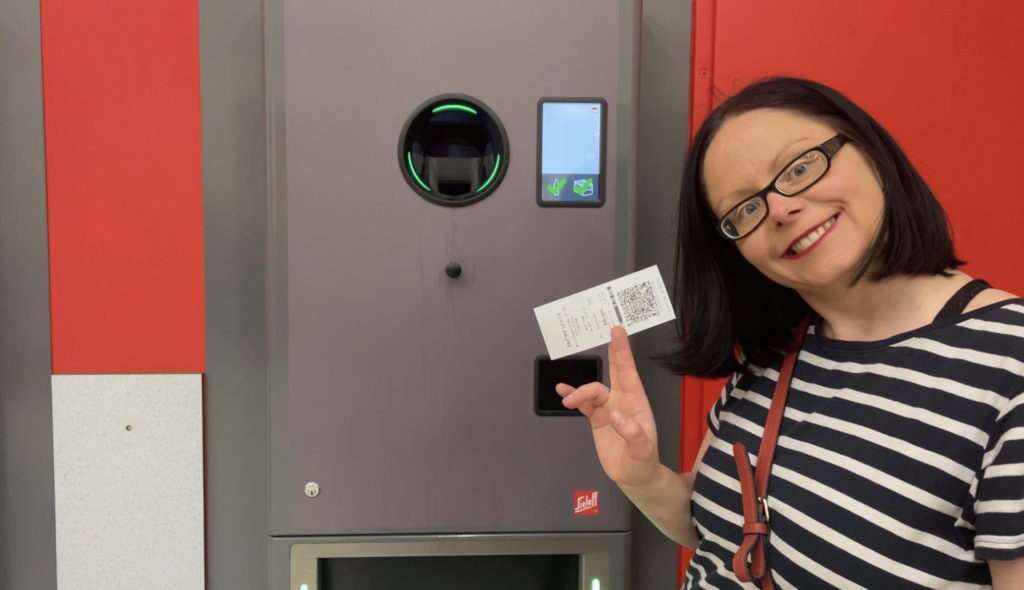
I developed a bacteria infection while in Germany and I needed a course of antibiotics. I recieved the break down from the bill:
•Doctor visits ran between €12-18
•My antibiotics ran for €15
•I had several lab testings done all ranging between €20-45. My doctor at one point even said she wanted to ask my permission before doing one test because it was expensive. She said it would be €60. I can hear all the Americans chuckling right now. To top it off, my insurance paid for everything.
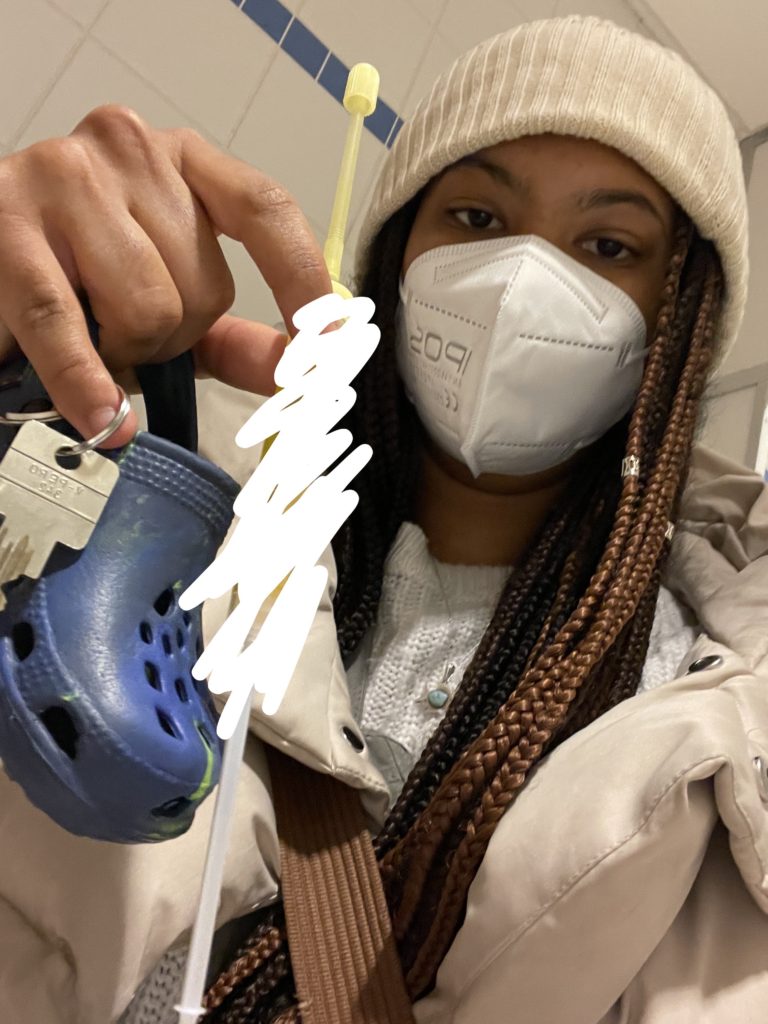
Having to walk through the entire doctors office with my urine sample

Getting flowers from the sweet Apotheke (pharmacy) man with my antibiotics promptly after

Biking around Leipzig
Care For the Environment
Like I mentioned earlier, Germans separate their trash waste into a bin for plastic, paper, compost, glass and regular landfill. It’s really admirable, that as a society, Germans truly take this seriously. My host parents were particular in ensuring this was done right because recycling was believed to be a collective effort. In the US, some states like Texas, don’t have recycling period, and in Washington, we mix our cans with our plastic and our glass.
One of the most significant out of body experiences I can recall, happened while I was recycling the glass. Glass is separated in Germany by color and in a communal bin in your neighborhood. This bin could be a good 5 minute walk away from your house. As I was lugging the monthly glass collection in my two tote bags draped over my shoulders, I said to myself “you could never make anyone in the US do this.”
Rare Online Shopping
I didn’t order a single thing off of Amazon in a year. German Amazon doesn’t carry nearly as many options as the one in the US, so you had to find what you were looking for in the city. It was essentially a social experiment that showed you can live without the demand of having everything you want, when you want it. You can learn to live modestly.

Having to walk through the entire doctors office with my urine sample

Getting flowers from the sweet Apotheke (pharmacy) man with my antibiotics promptly after
It was such a stress relief to know, that if I got sick or hurt in this country, I wouldn’t go bankrupt to get treated. My host mom was baffled by the fact that most Americans would ask their friends to drive them to the hospital if they got hurt because the cost of an ambulance ran you close to $500 and that’s probably the cheapest expense in your medical bill all together.
Work/Life Balance
Germans are really good about having a culture that sets boundaries between their work and their free time. Europeans love their vacations, Germans are guaranteed almost a month worth of vacation days (compared to an Americans yearly 10) and almost all businesses including grocery stores are closed on Sundays. When work ends, they’re big on letting it go and not talking about it outside of the work setting. Although you must plan accordingly to ensure you have all your ingredients for your meals or items for a project on Sunday, it’s a day that essentially all of your friends and family will be off. It’s a day everyone can come together and have a picnic in a park or hang out because it’s seen as a day to rest.
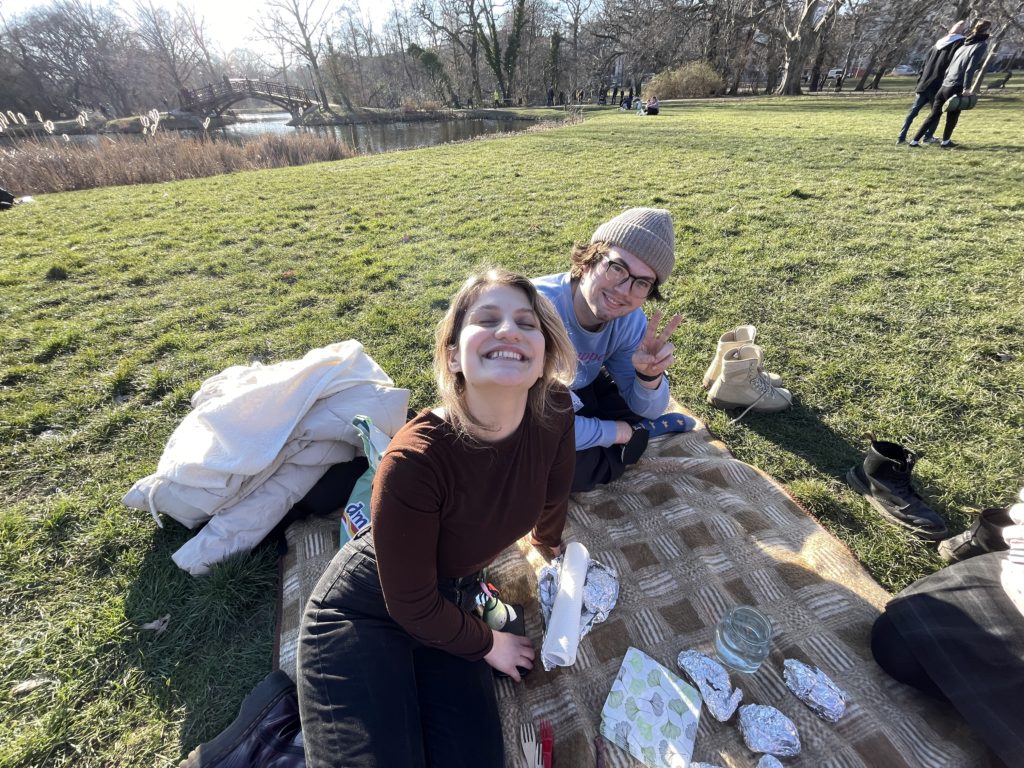
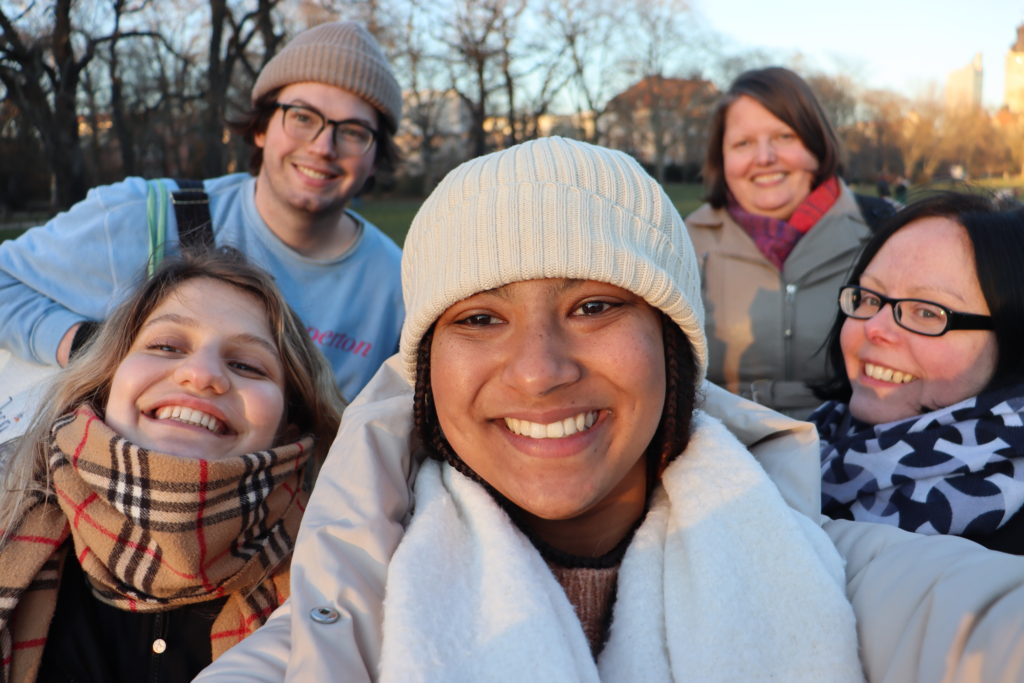
Sunday picnic in the park with a homemade cheesecake

Coffee and Cake When Invited To Someone's House
This is one of the cutest traditions of Germany that I absolutely love. Where anytime you are invited to someone’s house they usually always have coffee or tea waiting for you with some kind of cake or dessert. Its not uncommon for the host to even had baked it themselves. Sweden…let’s take some notes.

Coffee and cake culture of Germany
Mr.Baker in Köln, Germany had a grip on our cohort
Local Bakeries
German Bakeries were my staple breakfast during my language school and University phase. The frequency of having cheap, fresh breads from local bakeries in your neighborhood is the start of world peace.
Mr.Baker in Köln, Germany had a grip on our cohort
Negative German Culture Shocks
The German Stare
What took me aback the most, out of anything, was the staring. Infamously known as The German Stare.
We gotta stop this Germany. Europeans as a whole, but Germans specifically, stop with the staring contest. Lower your gaze.
Is it because of what you’re wearing? Is it because you’re pretty? Is it because you’re naked in an U-Bahn? You’ll never know because they won’t ever tell you. For the ones who wouldn’t drop their gaze, I usually ended up smiling and waving to them. I found the German stare to be more inquisitive than anything.
Nonetheless, to my Germans who are going to visit the US, unless you’re going say something to someone, don’t stare and especially for so long. The length of holding it is what’s incredible. That habit might land you a roundhouse kick to the face if you do that to the wrong person here. This tip is to save everyone an unwanted interaction.
German Universities
I was taking a semester of classes at Universität Leipzig during the study phase of my CBYX Fellowship. I signed up for one Bachelor’s course, two Master’s courses and a German language course. Most of our classes were seminar style, meaning, fewer people, ranging from 12 to 25 students per class. I really liked when it came to discussions; it was more intimate and less intimidating.
One of my favorite classes was called European Democracy Promotion. We discussed subject matter around how Europe is promoting its democracy onto other nations in an effort to ‘save them.’ One class discussion that I really enjoyed was surrounding the idea of EU membership. How, in order to keep their reputable image, the EU doesn’t allow certain countries to join so they can retain importance and exclusivity. I really enjoyed the thought provoking conversations we had in that class and the critical thinking that had to be done to assess if this was for the greater good. This class is what ignited my interest in attending college after my year abroad. The critical thinking about world events and classroom discussions I was having with my peers lit up a passion in me that I hadn’t felt in a while.
Besides that one class, my other three were very dull in comparison. I truly didn’t like the style of teaching. It was outdated in the sense of you essentially taught yourself out of a book. German class scheduling was also really infrequent. Essentially, every class is only held once a week. So to fill your schedule, you must have about eight classes a semester. I didn’t think that was helpful for retaining information because of how little the class met. Professors almost always left when class was done, they didn’t stick around to talk to you or answer questions. Other CBYXers said that it was common for professors to be consistently absent in general. The class presentations were very immature given these were 18-25 year olds. I’m curious if German students are given speech classes in their high school curriculum because many didn’t know the basic rules of it. Presentations went on for an exhaustive amount of time in a very monotone voice with a powerpoint slide filled with over 20 bullet points. The culture of teaching, unfortunately, turned me off from wanting to go to university in Germany.
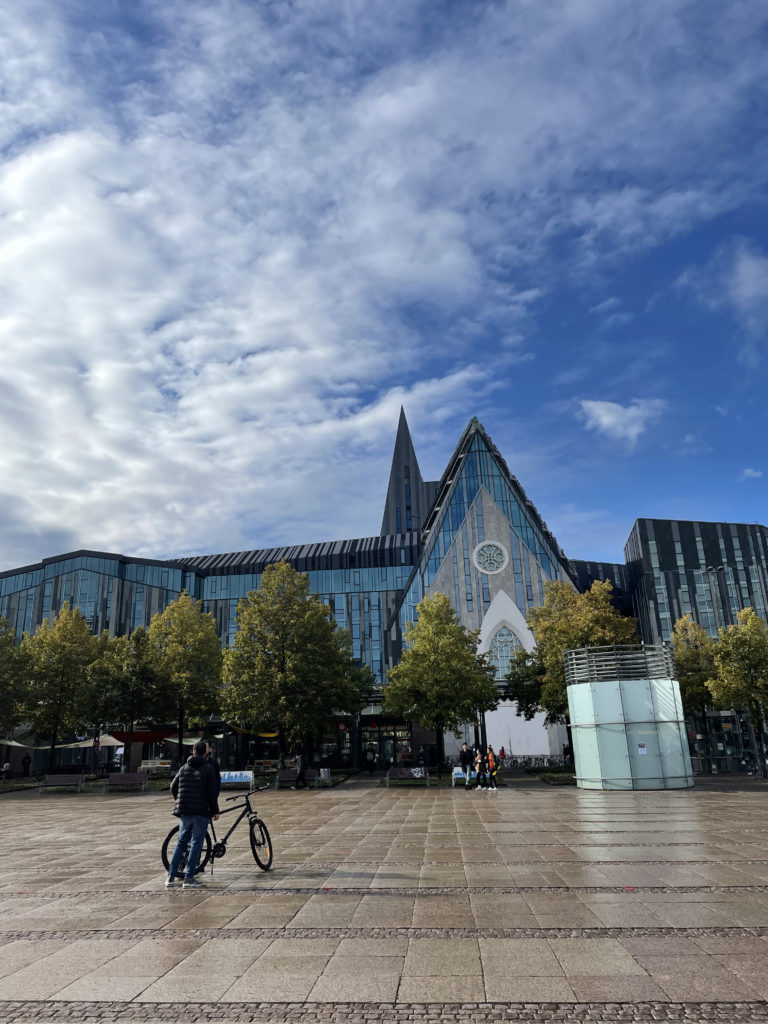
Universität Leipzig
No Free Water or Bathrooms
The US has its problems but we do this right. In Germany, almost all restaurants require you to pay for water. Including tap water – the same water that comes out of the faucets from the restrooms. From what I remember, I think even fast food restaurants only provided water bottles at a charge. I’m used to the system in the US where they give you a nice big cup of cold ice water, once the host seats you at your table. Throughout your dining, the waiter will fill it as many times as you like with their pitcher of water or even leave a personal pitcher at your table. In Germany, you can either pay for a glass of tap water they fill up themselves or you can buy a bottle. You will have your choice of still or carbonated water with a small glass to pour into that looks to be the size of a pallet cleanser than a sturdy cup to drink from. On the few rare occasions would a business provide free tap water. For the ones that didn’t, depending on the circumstance, I became shameless and would fill my water bottle in their restroom. I didn’t see the reason for paying for the same water that was in their water closet – and I’m petty. It was my form of protest.

Universität Leipzig
The country as a whole doesn’t build water fountains either. In the US you’ll see them in waiting rooms of doctors’ appointments, in the back of grocery stores, and in shopping malls. Germans, I guess, just forgot to include them and no one has complained. Germans and Europeans as a whole seem to drink a lot less water compared to people in the US. I’m not built like them and I would’ve gone dehydrated if I didn’t attach my water bottle to my hip that entire year.
However, one downside of staying hydrated is you will have to regularly use the bathroom. Then in this case, maybe it makes sense for a nation to incentivize drinking less water as a means to prevent bathroom usage too. Because going to the bathroom in Germany is also not free. If you are a patron at a German restaurant or cafe, you can use the facilities. But if you’re out running errands or exploring the city and take one too many sips before it’s time to go home, you’re screwed. You’re options then include: buying something from a cafe you don’t need just to use their restroom, begging that said cafe without buying anything or hopefully you have the right change and can use one of the few paid public restrooms in the city. Bathrooms in grocery stores and department stores don’t exist and they’re more strict about it at fast food restaurants too.
This system is classist and it was my biggest pet peeve living in Germany. But so are many American systems. Capitalism proceeds as normal.
Colder Culture
One of my greatest deal breakers for not wanting to live in Germany long term, was the culture being a little too cold for me. When speaking and interacting with Germans one on one, they are wonderful, everyday people. However, as a culture, it was different. “Hello’s” or “good mornings” when you pass people on a walk through the park or in your neighborhood are rare. Even when you do it first, they make a twisted face because they’re surprised you’re talking to them in the first place. My host mom and the other German friends didn’t understand this concept of saying hi to people you didn’t know either. They thought it was weird. Which was funny because they thought staring intesenly wasn’t. It felt like most Germans were on the defensive side when I would say hi. Coming from living in cities in the US, where everyone talked to you, I found this really strange and it felt quite lonely.
Grocery stores were one of the bigger shocks, as the cashiers don’t have a conversation with you or even ask how you are like the ones in the US do. Instead, your life flashes before your eyes as you try to bag all the items into your tote bag as fast as you can to keep up with the insane scanning speed. The interaction is “hello,” “cash or card?” then “goodbye.” If you’re not gone by the time the person hands you the receipt, patrons behind you start groaning, huffing and puffing in annoyance. The one time a German cashier asked how my day was, I naturally assumed he was flirting.
I believe that saying hi and smiling to people you pass in your neighborhood does no harm and makes your day only better. I ended up turning it into a game for myself as to how many Germans I could say hi to when going on walks in my city.
I was on a train ride one time talking to a German girl who said she did an exchange in the US. She said that an American struck up a conversation with her while she was in the toilet paper aisle of a grocery store. She couldn’t believe how Americans can literally talk to you about anything. I started indoctrinating my host mom with the idea of small talk and how it’s not disingenuous, it’s just a way to turn strangers into friends. One morning, Julia came back from the bakery after trying small talk, and she said that the woman at the counter just gave her a blank stare. I told Julia to never stop though.
I also lived in east Germany which is historically more conservative due to the GDR. With my travels throughout the country, I found the city of Berlin to be the most friendly and kind because of how international it was. However, my friends who lived in the south, such as Radolfzell, said that that area was also perfectly pleasant. The east, especially, felt much more cold.
Turning it into a game of how many Germans I could say hi to throughout my day
I do wonder if the pandemic also soured the Germans further. Germany had strict lock down regulations for the longest time. It wasn’t until the end of spring when things started opening back up. I remember returning from Greece and stumbling across a festival in Leipzig with my friend Nora. Here was the diary entry from that day:
Once I arrived back to Germany, all of a sudden this place changed. The mask mandate lifted, the sun was out and people were happy. I literally felt truly comfortable in Germany. There was a market, kind of like the Christmas ones but for Easter. And everyone was happy and so nice and literally coming up and talking to Nora and I. The entire mood was unlike any other I’ve seen in this country. I started talking to this lady who was German but lived in Greece for 25 years (some of her family was even from Lesvos). She told me she moved back to Germany two years ago because of a boyfriend and went on to say “how could you like it here? With the lockdown and restrictions, everyone was so angry and miserable and depressed. It was never this strict in other countries, so the people were in a horrible mood here all the time. Today is when life feels normal again.” I honestly never gave Germany that kind of credit either in that regard, restrictions in the US were never this hard nor did they last as long. I was so happy to finally see life and laughter in people. And it has continued ever since. People are saying hi back continuously or even doing it first, talking to me unannounced in my neighborhood, and the pharmacist at the Apotheke gave me flowers just because. I wish I could’ve felt this side of Germany longer.
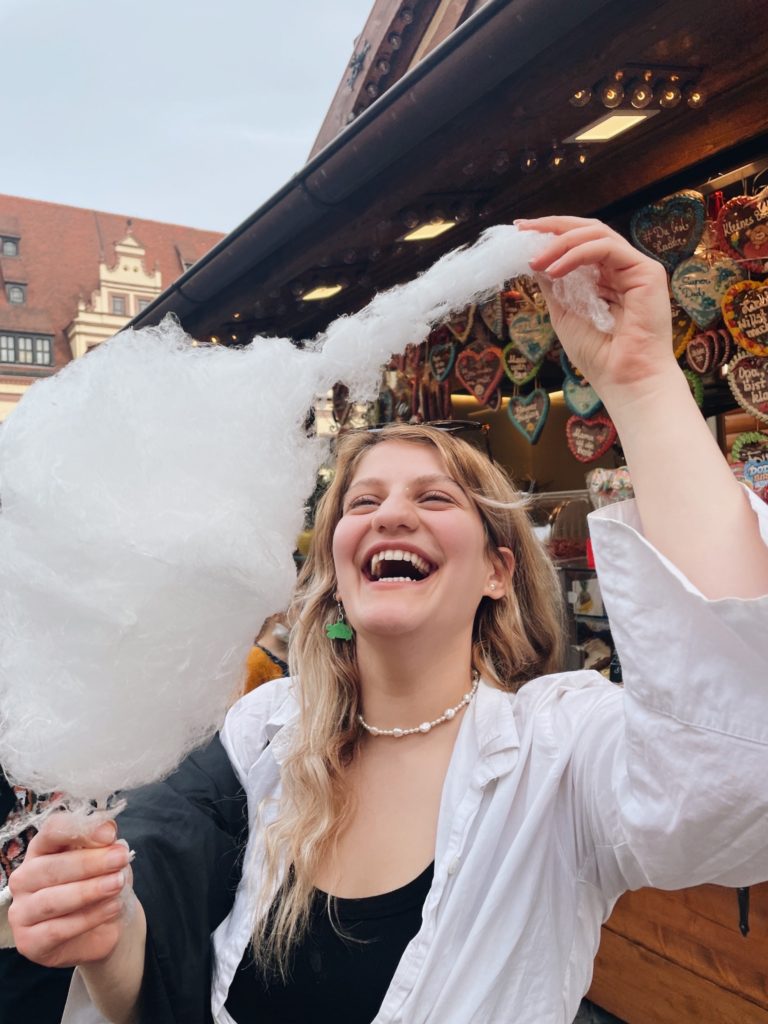
Nora with cotten candy from the German Easter Market. One of the first markings of the end of COVID lockdowns in Leipzig
